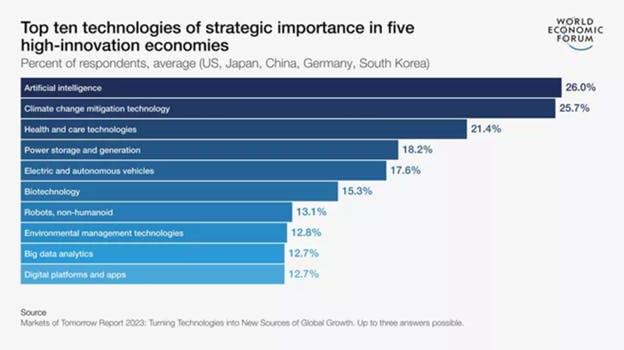
Innovation culture
Keeping a pulse on current and emerging trends helps us navigate the potential impacts and opportunities for our clients and our firm.

The news was full of headlines and articles in the weeks after this year's World Economic Forum (WEF) meeting in Davos. The event inspires mixed opinions and sentiment around this event, but regardless of where one stands on the event itself, it is universally acknowledged the event offers a glimpse into key topics that may affect organizations in the near future.
The WEF is a Swiss-based not-for-profit organization established in 1971. As an independent organization, WEF brings a multistakeholder point of view by engaging political, business, cultural and societal leaders to shape global, regional and industry agendas. As part of its mission, WEF believes “progress happens by bringing together people from all walks of life who have the drive and the influence to make positive change.”
One of the primary ways the WEF achieves this is by holding four annual meetings, the first of which takes place in Davos Klosters, Switzerland, and is often referred to simply as “Davos.” This year’s meeting took place Jan. 16-20, 2023, and had a record attendance of over 2,600 leaders. It included more than 300 sessions on various topics such as the climate and energy crisis, emerging technologies, and predictions for a global recession and the future of work.
Davos has a reputation for affirming trends and providing insightful information on present and future developments, specific to evolving industries, innovative topics and environmental, social and governance (ESG) initiatives. Organizations can gather insight and action steps for how to strategically prepare and adapt for the future.
As the 2023 WEF got underway, discussions focused on the global economy, climate change and the conflict in Ukraine. However, by the end of the forum, the digital economy and the rapid technological advancements of the past six months had taken center stage. This shift was driven by the pace at which the digital ecosystem is introducing new technologies, causing world leaders to place a strategic emphasis on these advancements for the future growth of their businesses. The chart below illustrates how industry leaders of high-innovation countries (the United States, China, Japan, Germany and South Korea) view artificial intelligence (AI) as the highest-priority technology for the next decade.

To learn more, the entire Markets of Tomorrow Report 2023 provides in-depth insights into each subcategory.
As global digitization rapidly progresses, Klaus Schwab, the founder of the WEF, describes this acceleration of technology as the Fourth Industrial Revolution. This revolution underpins AI, robotics, the Internet of Things (IoT), quantum computing and their associated segments as the catalysts for the future of technological innovation. Davos spotlighted the digital economy by presenting both short-term technological innovations and long-term strategies with the potential to revolutionize the digital landscape for years to come, some of which are highlighted below:
Each year, the WEF releases a global risk report ahead of the Davos meeting. There is usually a strong correlation between top risks and agenda topics and this year was no exception. More than half of the top 10 short- and long-term risks are environmentally related, with social issues as the next highest category. A few of the key highlights:
The 2023 World Economic Forum meeting provided significant insight into how leaders worldwide view matters surrounding technological innovation and ESG. Through the discussions at Davos, organizations can garner insights on emerging and future themes that warrant thoughtful consideration. Organizations can remain watchful for additional thought leadership to prepare for coming developments that could present both risks and opportunities for their organization.

Keeping a pulse on current and emerging trends helps us navigate the potential impacts and opportunities for our clients and our firm.